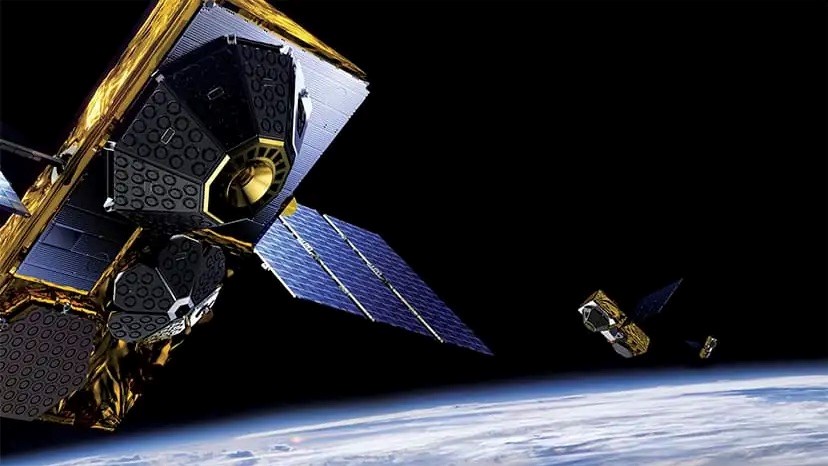
- LEO satellite operator Globalstar unveils growth forecast
- Swisscom receives final approval for Vodafone Italy acquisition
- Qualcomm emerges unscathed from Arm wrestle
- Global 5G connections top 2 billion
In today’s industry news roundup, the final one of 2024: Satellite operator Globalstar has unveiled some bullish sales growth projections; Swisscom is all set to merge its Fastweb subsidiary with Vodafone Italy following final regulatory approval for its M&A deal; Qualcomm has emerged almost victorious from its court battle with Arm; and there are now more than 2 billion 5G connections in the world.
Low-earth orbit (LEO) satellite operator Globalstar, which recently announced a $1.1bn investment from Apple, is feeling bullish about its growth prospects. Following its recent investor day, the company has shared an update on its customer base and financial projections. It currently serves 260,000 active mobile satellite service (MSS) customers, connects 481,000 IoT devices, and noted that its renewed deal with Apple – which it refers to as its “wholesale customer” – includes a “new satellite constellation, expanded ground infrastructure and increased global MSS licensing”: Apple relies on Globalstar’s constellation of satellites to support its Emergency SOS service on iOS devices in select countries, a relationship that has been in place since late 2022. Globalstar reiterated its full year 2024 revenue guidance range of $245-250m and adjusted EBITDA margin of 54%, unveiled full year 2025 revenue guidance of $260-285m and adjusted EBITDA margin of 50%, and noted that, in the “longer term” (unspecified), it expects its annual revenues to more than double to over $495m, with adjusted EBITDA in excess of 54% “in the first full year of extended MSS network service”.
Swisscom has received approval from both the Italian Competition Authority (Autorità Garante della Concorrenza e del Mercato) and the Ministry of Enterprises and Made in Italy (MIMIT) for its planned acquisition of Vodafone Italy. Swisscom announced an agreement to acquire Vodafone Italy for €8bn in March, having signalled its intention to do so in February, and plans to merge the mobile operator with its existing Italian fixed line operation, Fastweb. These approvals “pave the way to the creation of a leading converged challenger in Italy, as all competent authorities approved the transaction,” noted Swisscom in this announcement. The Italian Competition Authority cleared the transaction thanks to some “behavioural commitments proposed by Swisscom,” noted the telco. “These include the continued provision of wholesale services to interested operators in line with Fastweb's current practice and the sharing of information in any public tender for fixed telephony and fixed connectivity services issued by the public administration, where Fastweb or Vodafone Italia is the current supplier. An independent monitoring trustee will ensure that the commitments are honoured. The commitments apply for three years.” Swisscom expects the acquisition deal to be completed during the first quarter of 2025.
Qualcomm has emerged relatively unscathed from a court battle with Arm, with a jury finding that the wireless chip giant has not breached the licencing deal struck with Arm by Nuvia, a startup that Qualcomm acquired for $1.4bn in 2021. In September 2022, Arm sued Qualcomm for a “breach of certain licence agreements” by Qualcomm and Nuvia, but the jury decided that the licence deal had not been breached by Qualcomm and that Qualcomm’s Orion chips, created using Nuvia’s technology for its push into the PC market, are also covered by the agreement, reported Reuters. Qualcomm announced late Friday that it is “pleased with today’s decision. The jury has vindicated Qualcomm’s right to innovate and affirmed that all the Qualcomm products at issue in the case are protected by Qualcomm’s contract with Arm.” But the jury could not agree on whether Nuvia had breached the licencing deal (even though Qualcomm had not), which means the case could be tried again in the future, though the judge presiding over the case in Delaware court, encouraged the two parties to reach an agreement between them rather than start a fresh legal battle. Industry analyst Richard Windsor agrees with that sentiment, noting in his final Radio Free Mobile blog of the year that “Arm and its customers should be working together to expand its reach into PCs, vehicles, servers, AI and so on and not wasting time and resources fighting each other.”
While 5G is still not a gift-wrapped present for telco CFOs, as TelecomTV noted in November, it’s giving statisticians plenty to get excited about. According to research house Omdia and industry group 5G Americas, the number of 5G connections worldwide surpassed 2 billion during the third quarter of 2024, up by 48% year on year, with more than 170 million added during the third quarter alone. “Projections indicate that 5G connections will climb to 8.4 billion by 2029, accounting for 59% of all global wireless technologies,” noted 5G Americas in this press release. North America accounts for 264 million of the global total, with 5G accounting for 37% of all wireless connections in the region (higher than the average of 17% across all regions). There are now 341 commercial 5G networks in operation globally, compared with 706 4G/LTE networks.
– The staff, TelecomTV
Email Newsletters
Sign up to receive TelecomTV's top news and videos, plus exclusive subscriber-only content direct to your inbox.




